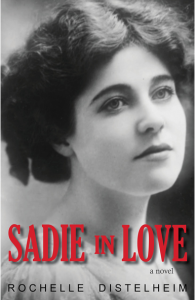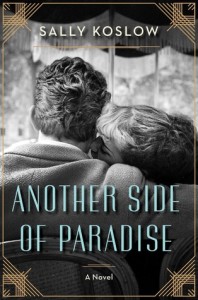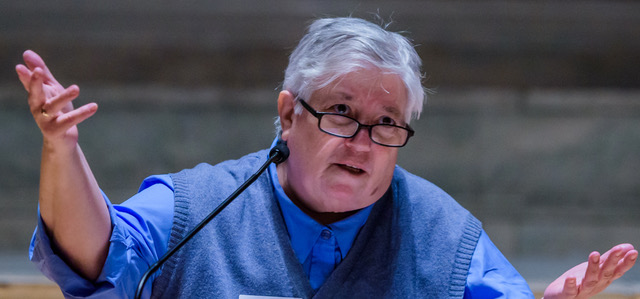The Lilith Blog
May 30, 2018 by Rochelle Distelheim
Sadie Schuster’s Magic Love Knots (Part 2 of “Sadie in Love”)
All this week, in the grand tradition of Victorian periodicals, Lilith will be serializing an excerpt of Sadie in Love, the debut novel from 96-year-old former magazine editor Rochelle Distelheim. Look out for new installments every day this week.
Sadie in Love: Part 1| Part 2 | Part 3 | Part 4
Sadie Schuster sold love knots, hope wrapped in a schmattah, fifty cents. A lot of money in 1913, but hope never came cheap, especially when it came from Sadie Schuster. “You think this business makes me rich?” she asked her customers. “I do it to make people happy. The material alone costs me forty cents.”
She learned her magic tricks in Poland, where she and Fivel lived before coming to New York, two greenhorns, just married, and talked about love knots as though there really was magic in this world, and only she, of all the Jews in New York who came from Minsk, from Riga and Lublin, Budapest and Warsaw, knew how to put them together.
It was a secret, she said, passed from mother to daughter. Her own daughter, Yivvy, who ran a second-hand shop, and worked the cash register nights at the Second Street Cafeteria, didn’t believe in love or magic. Take it or leave it, Sadie Schuster was the only love knot person in New York City.
- No Comments
May 29, 2018 by Yona Zeldis McDonough
What It’s Like to Publish Your Debut Novel… at Age 90
All this week, in the grand tradition of Victorian periodicals, Lilith will be serializing an excerpt of Sadie in Love, the debut novel from 90-year-old former magazine editor Rochelle Distelheim. Look out for new installments every day this week.
Sadie in Love: Part 1| Part 2 | Part 3 | Part 4

Sadie Schuster—fortyish, plumpish, a suffragist, and recently widowed—spends more time now talking to her late husband, Fivel, than she did when he was alive. Sadie keeps Fivel informed of her daily activities—especially her pursuit of a husband—because “An empty bed is a cold place for a hot-blooded woman.” A lover of ballroom dancing, the moving pictures, and night-school English words, Sadie’s true talent lies in the magic love-knots she artfully crafts for lonely, unwitting, immigrants willing to purchase hope wrapped in a schmattah for fifty cents.
Selling love-knots while seeking love, Sadie consults with her magic spirits to woo Herschel—the muscled ice peddler who reads poetry and pines for his newly departed wife. Her daughter, Yivvy, sells secondhand, possibly “pinched” tchotchkes in her antique shop and plans to marry the Irish cop on the beat. Enter Ike Tabatnik, the “Dance King of Riga, Latvia,” just off the boat and ready to take on America—and Sadie’s heartstrings. Comedy and chaos follow.
A stunning confession, following the wedding of one of her love-knot clients—which begins with one groom and ends with another—pushes Sadie to make a surprising choice. She then throws herself at the mercy of her magic spirits, asking them to do quickly for her what they have been doing for her customers—before it’s too late. Fiction Editor Yona Zeldis McDonough talks to Rochelle Distelheim about what it feels like to have her debut novel published when she’s in her nineties.
- 1 Comment
May 24, 2018 by Helene Meyers
Why Did I Cry for Philip Roth?
Unbidden, copious tears were my initial response to the news of Philip Roth’s death. That visceral response of grief surprised me. Of course, as a professor of Jewish literature, I have written about and taught some of his books during the course of my career, most notably, The Human Stain, The Plot Against America, and, to a mostly female group of adult learners, Portnoy’s Complaint (I freely admit that I am much too prudish to teach the last to a group of traditionally-aged undergraduates).
But much as I admire Roth’s literary chops and chutzpah, he was never the center of my Jewish American literary universe. My critical kvelling tends toward such heavy hitters as Michael Chabon, Rebecca Goldstein, and Tony Kushner as well as such lesser known figures as Tova Mirvis, Judith Katz, and Michael Lowenthal. As a Jewish feminist, I found Roth’s literary performances of bad-boy masculinity more than a bit trying (I’m attempting understatement here). And his larger-than-life reputation (much of it earned, some of it the result of a critical boys’ club) tended to suck the air out of the room for other Jewish writers.
The contemporary Jewish American literary renaissance is broad and deep; Roth-mania inside and outside the academy had the potential to lionize the one at the expense of the many, especially women and queer writers of all genders. My personal critical practice has been to give him his due but to avoid idol worship. I wouldn’t, couldn’t put him on a patriarchal pedestal, but neither would I leave him behind in the misogynist mud.
- 1 Comment
May 23, 2018 by Yona Zeldis McDonough
A Novel Imagines F. Scott Fitzgerald’s Lesser-Known (and Jewish) Love Affair
In 1937 Hollywood, gossip columnist Sheilah Graham’s star is on the rise—while literary wonder boy F. Scott Fitzgerald’s career is slowly drowning in booze. But the once-famous author, desperate to make money penning scripts for the silver screen, is charismatic enough to attract the gorgeous Miss Graham, a woman who exposes the secrets of others while carefully guarding her own. Like Fitzgerald’s hero Jay Gatsby, Graham has meticulously constructed a life far removed from the poverty of her childhood in London’s slums. And like Gatsby, the onetime guttersnipe learned early how to use her charms to become a hardworking success; she is feted and feared by both the movie studios and their luminaries.
A notorious drunk famously married to the doomed Zelda, Fitzgerald fell hard for his “Shielah” (he never learned to spell her name), who would stay with him and help revive his career until his tragic death three years later.
Working from Sheilah’s memoirs, interviews, and letters, Sally Koslow revisits their scandalous love affair and Graham’s dramatic transformation in London in her new novel, Another Side of Paradise, out this month from HarperCollins.
Koslow, the former editor-in-chief of McCall’s Magazine and author of four other novels, including acclaimed international bestseller The Late, Lamented Molly Marx, talks to Fiction Editor Yona Zeldis McDonough about how she came to uncover the secrets of Graham’s past—and why.
- 2 Comments
May 22, 2018 by The Editors
News From Lilith: An Emerging Writer’s Program and a New Digital Editor
New York, NY — Lilith Magazine has been awarded a $10,000 grant from the Jewish Women’s Fund of Atlanta to support emerging feminist writers. The timing makes the grant particularly significant, as the reverberations of the #MeToo movement in Jewish communities and in the media world underscore the importance of amplifying more women’s voices and perspectives.
Lilith—independent, Jewish & frankly feminist—is marking its 42nd year of fearless publishing as the feminist change-agent in and for the Jewish community, amplifying Jewish women’s voices, creating a more inclusive Judaism, spurring gender consciousness in the Jewish world and empowering Jewish feminists of all genders to envision and enact change in their own lives and their communities.
“We’re thrilled to be partnering with JWFA to launch this needed program,” says Susan Weidman Schneider Lilith’s editor in chief and one of the magazine’s founding mothers. “Emerging Jewish feminist writers need good editing, mentoring, and a platform for their unique voices. Lilith’s goal is to provide all three.”
- 4 Comments
May 17, 2018 by admin
Ruth: the Torah of Transgressive Transformation
Shavuot: When Torah Comes from Earth More than from Heaven
As we take up the Book of Ruth for its traditional reading on Shavuot (this year, from Saturday evening, May 19, through Sunday evening, May 21) we may note that it bears special significance for the role of women in our own generation, and for changes in the meaning of Torah when change happens in society at large.

The story of Ruth brings together with almost invisible threads three seemingly transgressive women of the Bible. The Hebrew Bible conventionally assigns women to the role of motherhood, and it likes to tell the stories of how women who are denied the opportunity of motherhood seek it with great urgency. But in three stories of such women, the urge to be conventional empowers deeply unconventional change.
When the stories are first told, they seem to have no connection with each other. But then the Book of Ruth links the three stories by threads that are almost invisible — but not quite. The gossamer threads of connection strengthen each separate story into an epic of ironic transformation. (more…)
- No Comments
May 16, 2018 by Eleanor J. Bader
Leslie Cagan’s Half-Century of Activism
When Brooklyn for Peace named community organizer Leslie Cagan one of three Pathfinder for Peace award winners in late 2017, it was both in recognition of, and in gratitude for, Cagan’s more than 50 years of social justice activism. Whether pushing for action on climate change, peace, LGBTQ equality, feminism, reproductive choice, or fighting racism, Cagan’s voice, presence, and expertise have long been visible.
Cagan has worn a lot of hats over the years. Among them, she was the interim board chair at the Pacifica radio network in the late 1990s; was National Coordinator of United for Peace and Justice from 2002-2009; and either coordinated or played a leadership role in some of the largest demonstrations in American history—for nuclear disarmament in 1982; for LGBTQ rights in 1987; against the war in Iraq in 2003; and for climate action in 2014.

Opening comments from Leslie Cagan, a leader in the Peoples Climate Movement NY – Peoples Climate Movement 2018 Kick-off event is a city-wide organizing meeting on learning how you can get more involved in climate campaigns. Followed by brief updates on the exciting work of several campaigns and breaking groups focused on how we can strengthen and expand climate action in New York City and NY State, as well as nationally. (Photo by Erik McGregor)
She is presently involved with the Peoples Climate Movement (PCM)—NYC, as well as PCM nationally, and is part of an effort challenging the corporate saturation and over-policing of the Heritage of Pride parade held annually in NYC to commemorate the 1969 Stonewall rebellion.
Cagan recently spoke to Eleanor J. Bader about her history, ongoing work, and the personal challenges of caring for life partner Melanie Kaye/Kantrowitz, who has advanced Parkinson’s Disease.
Eleanor J. Bader: Let’s start with your personal history. When did you become involved in progressive political activism?
Leslie Cagan: I grew up in the Bronx, in a Jewish, leftist community. My parents were hardcore activists. I have an older brother and a younger sister and family outings growing up would often involve going to a demonstration. My grandmother was active in the textile workers union so I guess you can say that politics has always been in my blood. Their example was important and impacted all of us. Both of my siblings are activists. (more…)
- 2 Comments
May 11, 2018 by Marlena Maduro Baraf
A Grandmother’s Mindfulness
 When my granddaughter is peaceful, I can sometimes see words making their shapes behind her face. Her eyes dart here and there, and they stop. Words spill past her ruby lips. “…that other fruit, the one that’s not an orange… pomegranate… like my party dress…”
When my granddaughter is peaceful, I can sometimes see words making their shapes behind her face. Her eyes dart here and there, and they stop. Words spill past her ruby lips. “…that other fruit, the one that’s not an orange… pomegranate… like my party dress…”
I try to coast along on her reverie.
Penny is seven. She’s figured out that I exist when she’s not around. I come and go. I will go; she knows this too.
“Grandma, you are going to die because you’re old.” I am on my way up the stairs and Penny hurls this thought at me across the railing. Then she hesitates and adds less brightly, “If you eat healthy and do your exercise, you won’t die so fast.”
At seventy-two I am one year older than my mother when she died. I think of this most days as my life rushes by, a job, a husband, and self-imposed obligations. Hours are whizzing by, and I can’t unspeed the clock.
When we play “Just Spit It Out!” and Penny gets to go first being the youngest and is asked to name two breakfast foods served at Wendy’s, Penny pulls her shoulders up, tight up to her neck. Her eyes open big, and she lifts herself high on her tippy toes. “Eggs and bananas!” She laughs and runs into the kitchen.
In a tub full of rubber ducks Penny lets me wash her thick hair that is almost black and rinse it many times, as long as I hand her the slip-on terrycloth mitt to squeeze against her eyes. My own hair is thinning; the color is quickly fading. Who will wash my thinning hair?
Will I be trusting?
Penny has become a little sharp. I can no longer bite her arms in jest. Turns her head with a frown; she lets me know. She will show me her painting when she is ready. She is the youngest of two, pushed by a now-bossy sister.
I pay attention.
This is what I do.
- No Comments
May 4, 2018 by Joshua Wolfsun
Why We Need an Alternative to the Nice Jewish Boy
As a young Jewish boy, Jeffrey Tambor loved to read books. He would ask his father every night to take him down to the local library, and he would stay there until it closed. But, he told The New York Times in March last year, “I kept it a secret from my friends, as I don’t think it would have been considered the ‘coolest’ habit.” Tambor also freely describes another thing his childhood friends wouldn’t have approved of: crying. In the Times interview, he repeatedly tells of crying and weeping, both as a child and an adult.
It was this apparent intellectual resolve, emotional sensitivity, and countercultural sensibility that Tambor brought into his most recent and successful work. He became a critical darling and beloved progressive icon for portraying Maura Pfefferman, a character who transitions, on Amazon’s groundbreaking show Transparent. As the show’s star, he became something of a spokesman on trans issues, patiently explaining concepts of gender queerness to Stephen Colbert in 2014, and declaring at the 2016 Emmys that he hoped he would be the last cisgender man to play a trans character.
Jeffrey Tambor was a progressive, intelligent, sensitive man. He was the very model of the kind of man parents want their nice Jewish boys to become. He was also fired from Transparent this year for sexually harassing and assaulting three of his colleagues.
- No Comments
May 2, 2018 by Yona Zeldis McDonough
“The Heirs” Asks For How Many Generations Can Guilty Carry On?
 After breaking her hip in a serious accident, Eleanor Ritter’s mother, Rose, a Holocaust survivor now living in New Jersey, suddenly starts talking about her harrowing childhood in Poland and the taboo subjects she has refused to discuss for half a century—even speaking in long-forgotten Polish. Around the same time, Eleanor learns that the parents of her nine-year-old son’s soccer teammate, Tadek, are Catholics from Poland.
After breaking her hip in a serious accident, Eleanor Ritter’s mother, Rose, a Holocaust survivor now living in New Jersey, suddenly starts talking about her harrowing childhood in Poland and the taboo subjects she has refused to discuss for half a century—even speaking in long-forgotten Polish. Around the same time, Eleanor learns that the parents of her nine-year-old son’s soccer teammate, Tadek, are Catholics from Poland.
As Eleanor becomes fixated with digging into the histories of both her mother and Tadek’s family, her obsession strains her already difficult relationship with Rose, as well as her marriage to Nick, an IT technician who is himself caught up in preparing for the feared Y2K turn of the millennium.
Eleanor starts flirting with the soccer coach, ignoring her 12-year-old daughter’s growing rebellion and her son’s misery when, messing up several games, he becomes the team pariah. Meanwhile, the “sure-fire” tech stock that Eleanor bought behind Nick’s back is losing money. Even as her quest nourishes an odd friendship with Tadek’s mother, it forces Eleanor to face the unavoidable questions: For how many generations can guilt carry on? And: What did your grandparents do to my grandparents?
Hawthorne, the author of the award-winning Ethical Chic: The Inside Story of the Companies We Think We Love and seven other books about business, consumers and social issues, talks to Fiction Editor Yona Zeldis McDonough about her journey from fiction to fact and then back again.
- No Comments
 Please wait...
Please wait...